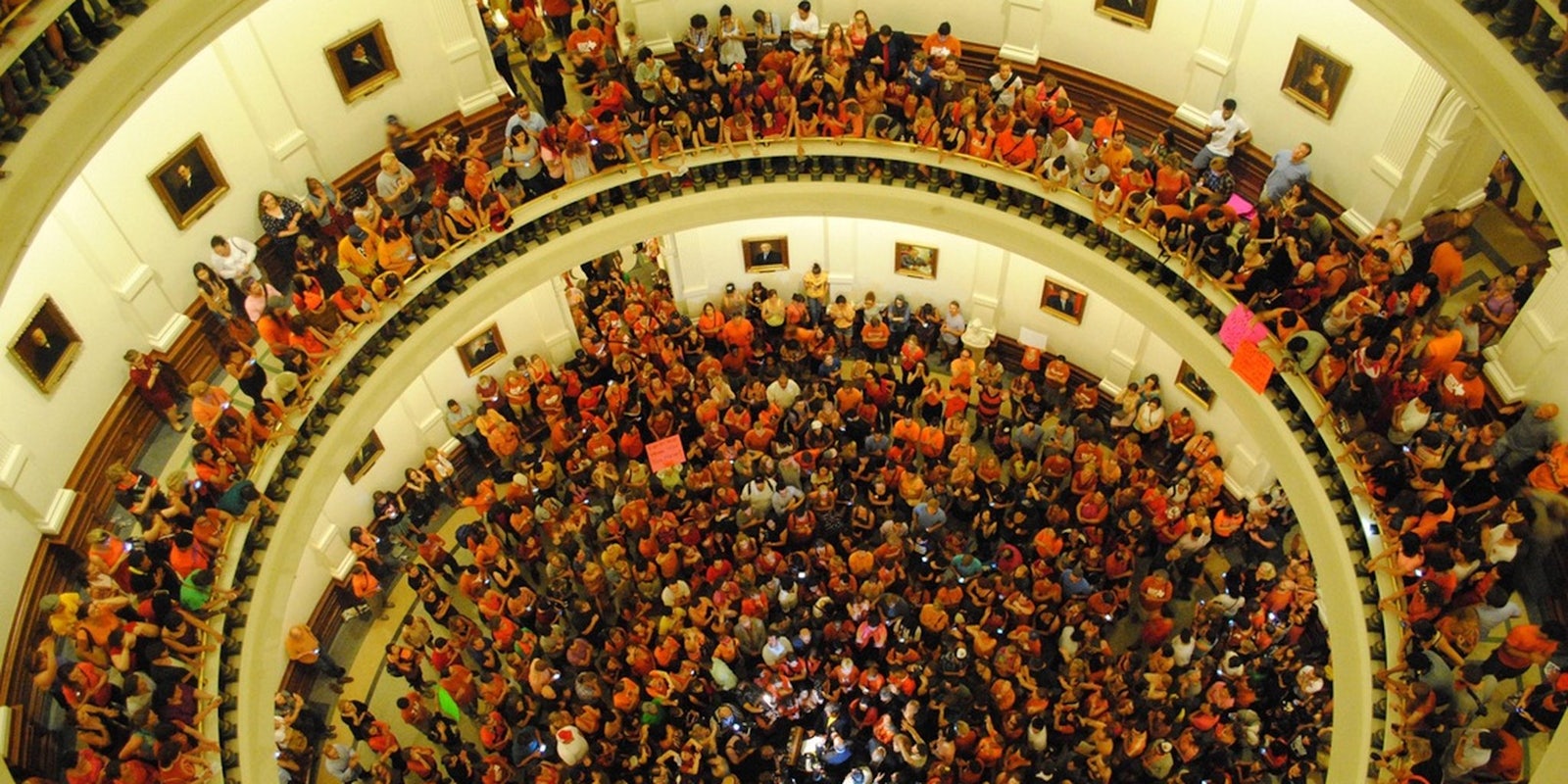History was made last night in Texas, with all of the trimmings of a standout political drama.
The important pieces were all there—a fierce, young state senator determined to stand for hours to filibuster a restrictive abortion bill, hundreds of fiery protesters filling the halls of the Capitol building with ear-shattering chants and partisan squabbling over hidden rules in state code. But for those not watching live streams and following Twitter reports, you probably didn’t know this was happening in the early hours of the morning.
The national mainstream media was nowhere to be seen, and CNN was reporting on what they felt was truly important—blueberry muffins.
Here is what happened:
State Senator Wendy Davis, a Democrat from Fort Worth, became an Internet star by attempting a 13-hour filibuster on the Texas Senate floor in protest of Senate Bill 5, a bill that opponents say would drastically turn back the clock on abortion rights in the state. Throughout her filibuster, in which she could not sit, lean, receive assistance, use the restroom or even drink water, Davis’ national popularity grew in bounds while she strived to reach her midnight deadline to delay a vote. The senator went from roughly 1,200 Twitter followers to more than 84,000 by Wednesday afternoon.
In the end, thanks to cheers and chants from onlookers who interrupted the proceedings, the official record showed the vote was recorded at 12:02 a.m., forcing the Senate to officially recognized the bill as dead after a challenge by Democratic senators.
Where was the national media?
While local news was clearly visible and produced great reporting (looking at you, Texas Tribune), absent from the drama of the Texas Legislature was the national mainstream media, and taking their place was an army of citizen journalists armed with livestreaming cameras and the power of the Internet. Some were on the ground, and some were thousands of miles away, using their online snooping skills to uncover pieces to the puzzle of the Texas filibuster.
The Daily Dot reported that two Twitter journalists, Circa’s Anthony De Rosa and former Reuters social media editor Matthew Keys, pointed out that official records were changed from originally reading a vote was taken after midnight to just before the deadline. This discovery led Democratic senators to speak up and question the timestamp of the vote.
Earlier in the night, Twitter user Heather Parker also brought a rule to the attention of Democratic Sen. Kirk Watson and Sen. Judith Zaffirini. Her find was able to buy the politicians more time after Davis’ filibuster had received three strikes — or violations of certain filibuster rules. The third strike called against Davis dealt with going off-topic during discussion. Parker found the rule regarding what constituted “germaneness,” allowing the Senators to argue on behalf of Davis and push the clock toward the midnight hour.
This is actually incorrect: “after a third violation, the Senate may vote on the point of order.” That’s from the Senate page. #SB5 #TXlege
— Heather Parker (@heatherr_parker) June 26, 2013
Livestreaming ruled the Internet
One citizen journalist, Christopher Dido, livestreamed the protests throughout the night. He told the Daily Dot that he rushed over from work after reading a tweet that things were beginning to heat up at the Capitol.
“I was honestly just more or less fulfilling what I felt was an obligation to the people, making sure that everything got out,” he said.
Dido said that his livestream received at the peak over 31,000 viewers, but he received reports of up to 120,000 viewers since his livestream was mirrored by others across the Internet. Dido, a member of the Occupy movement, said that his reporting was meant to “restore the power to the people” after what he described as a silencing of women’s voices from supporters of the bill.
He said that his tactic of remaining live boosted his coverage above the mainstream media by going directly to sources and getting exclusive interviews.
“I was sitting there interviewing a CNN reporter and basically interviewing him instead of the other way around,” he said. “I got a live interview with Wendy Davis and nobody else had that.”
Dido said that he felt the state is reaching a “tipping point” and could see intense protests like the “Moral Monday’s” in North Carolina if the bill is brought back up again in a special session by Governor Rick Perry. In this case, Dido thinks the mainstream media will need to take a note from citizen journalists book and go directly into the action — even willing to get arrested if the situation called.
While it is unlikely mainstream journalists will resort to livestreaming hours of intense protests and taking up an activist cause (something many citizen journalists readily admit to) there is something to be said about what transpired in the late hours at the Texas Capitol.
Twitter journalists and activists on the ground were able to bring fast, mostly accurate information to thousands of people across the world. While the national media was able to scrape the surface of the issue, citizen journalists showed that a little online research and a lot of time in the crowd could change the way we consume news.
Photo by Cody Permenter


